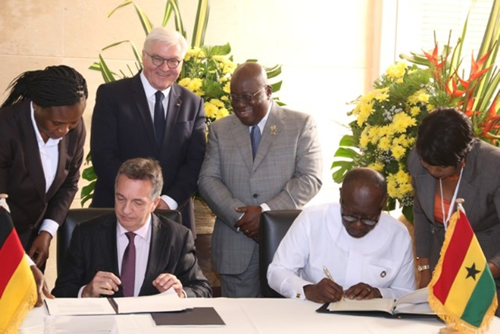
By Kofi Adu Domfeh
The Ghanaian government has been commended for the commitment to promote renewable energy in the country’s power generation mix.
In his 2019 State of the Nation Address, President Akufo-Addo announced that the seat of government, the Jubilee House, will from August 2019 be powered by solar energy.
This initiative would serve as an example for other public institutions.
“Government is committed to achieving an electricity generation mix that ensures diversity and security of energy supply. For this reason, we will continue to promote the deployment of renewable energy in line with our policy target of 10% renewables in the energy mix from the current 1%,” said the President.
Civil society group, Abibiman Foundation, has welcomed the President’s pronouncement, considering the efforts made by the government to achieve the 2030 Agenda for Sustainable Development, specifically SDG 7 – Affordable and Clean Energy, and SDG 13 – Climate Action.
“When honoured, it will demonstrate the President’s commitment to the achievement of the Sustainable Development Goals, especially as he is the Co-Chair to the UN Secretary General’s Sustainable Development Goals Advocates,” said Kenneth Nana Amoateng, Executive Director of the Foundation.
In 2016, Ghana ratified the Paris Climate Change Agreement to pave way for the implementation of its Nationally Determined Contributions (GH-NDCs).
The GH-NDCs seeks to develop a policy framework that integrates adaptation, mitigation and other climate related policies within broader development policies and planning in order to safeguard developmental gains from the impacts of climate change and build a climate resilient economy.
Ghana’s solar energy programmes include the attainment of utility-scale solar electricity from about 22.5 megawatts to 250 megawatts by 2030.
In addition, 200,000 solar systems for households, commercial and government facilities in urban and selected non-electrified rural communities will be installed and 55 mini-grid electrification systems with an average capacity of 100 kilowatts established.
Abibiman Foundation has urged the government to step up commitments to increase the proportion of renewable energy by 10% in the total national energy mix by the 2030 deadline.
“Ensuring the efficient production and use of renewable energy in Ghana is paramount to the country’s development. Even though we commend the government for its effort in working towards the attainment of universal access to energy by 2020, we believe a lot more could be done through improved access to various renewable energy technologies,” said Kenneth.
Most parts of Ghana enjoy high levels of solar irradiation all year round due to the abundance of sunshine. Yet solar energy only contributes 1% to the energy mix, as opposed to 59% from fossil fuels and 40% from hydro.
The Energy Ministry initiated the Solar Rooftop Programme to promote the use of solar power for government and public buildings to reduce expenditure on utilities.
“The Ministry is leading by example with the installation of a 65-kilowatt solar rooftop system at its premises,” President Akufo-Addo said.
Civil Society expects a comprehensive plan to roll out the programme to include ministries, department and agencies as well as metropolitan, municipal and district assemblies.
“We want to pledge our support to the government and its efforts to drive and improve the use of renewable energy in the country. Additionally, we will complement government’s efforts by creating awareness to drive adoption, improve advocacy and the deployment of various renewable energy technologies across Ghana,” said a statement from Abibiman Foundation.










